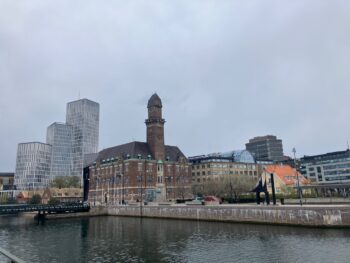We are developing the social individualist meta-context for the future. From the very serious to the extremely frivolous... lets see what is on the mind of the Samizdata people.
Samizdata, derived from Samizdat /n. - a system of clandestine publication of banned literature in the USSR [Russ.,= self-publishing house]
|
A song from the late 90s by Len. But this request (not to) was in vain, the UK government has announced £50,000,000 of funding to ‘dim the Sun’, in a bid to counter climate change, reports the Manchester Evening News, on the back of a paywalled report in the Daily Telegraph.
Scientists are planning on ‘dimming the Sun’ in a bid to curb global warming. The UK government is set to announce funding of up to £50m of funding for Sun-dimming experiments in the coming weeks, the Telegraph reports.
Does no one remember our wise Danish King Canute? He showed, over 1,000 years ago, that the State is all but powerless in the face of Nature. Of course not. Here is more on the plans.
It comes as the National Environment Research Council (NERC) announced on April 3 that it will invest £10 million of new funding to study these solar radiation management schemes (SRM).
According to Professor Mark Symes, the programme director for the Government’s advanced research and invention funding agency, known as Aria, there would be “small controlled outdoor experiments on particular approaches”. These experiments could include injecting aerosols into the atmosphere or brightening clouds to reflect sunlight.
Crucially, there is an acronym ‘SRM’, so this is one of those funding streams that will take on a monstrous life of its own. One might think that the Manchester Evening News (think Seattle but without the glamour) might have something to say seeing as it is a notoriously rainy city, but not a peep about the absurdity of it. Nor has there been any comment on the impact on solar energy generation, which provides ‘carbon neutral’ energy (but what about the deuterium lost in solar energy production?).
The UK government seeks to control the Sun, and how much it shines on you. Chairman Mao and the four pests comes to mind.
To be fair, these proposals have generated plenty of online ridicule, but that won’t stop it. That the UK is circling the drain is perhaps better shown by this Icarian hubris than anything else.
And of course, once you accept their premises, you are only arguing about tactics and strategy, not the ends.
Officers of the Swedish Police have made an announcement regarding the 30 or so bombings in the country in January 2025, attributed to extortion of businesses by criminal gangs, and have said that they can’t cope and they need all of society to mobilise to help them. However, they don’t appear to say how this should be done, or what with, so there might be some misinterpretation and I don’t think that the posse is a thing in Sweden, reported by the independent, reader-funded Nordic Times.
Swedish Police: “Everyone must take responsibility for the bombings”
This puts me in mind of a character in The Daily Telegraph’s Peter Simple column, who, as a fore-runner of today’s DEI activists would roundly proclaim ‘We are all guilty!’, a chilling vision of the climate today.
However, coming back to Sweden, we are told:
– The whole society must be mobilized. Everyone must take responsibility and do even more, said Tobias Bergkvist, deputy regional police chief for Stockholm.
During a press conference on Wednesday, the police emphasized the urgency of the situation and the need to take action to stop the wave of violence.
– We have a very serious situation, not only in Stockholm but also nationally, Bergkvist emphasized.
The Nordic Times has its own take on the matter, citing, as the BBC would probably point out, ‘without evidence’ networks of immigrant criminals.
The police do not seem to have gone that far in terms of specificity:
– What we are seeing now is an escalation of violence, but also a change in the problem. The majority of the bombings we have suffered in December and January have rather financial incentives, are strategic acts targeting companies and often for extortion purposes, says Hampus Nygårds, Deputy Head of the National Operations Unit (NOA).
“Criminal ecosystem”
He explains that the purpose of the attacks is to intimidate business owners into paying to stop the threat.
– Money is demanded to stop the violence and threats.
The police describe how a “criminal ecosystem” has emerged, where the recruitment of new perpetrators has now moved to digital platforms. Young people are offered money to commit acts of violence – including murder.
But there is a plan, nothing so far like what appears to be happening in the USA, this is Sweden after all, but the plan is an increased digital presence of the police.
The police are now mobilizing, especially in Stockholm but also nationally. We are taking measures such as reinforcements from different police regions, Bergkvist explains.
An important part of the strategy is said to be to increase the police’s digital presence and competence and to focus more on identifying and stopping bomb makers before the explosions are carried out, but the police believe that crime prevention work cannot be done by the authorities alone.
The UK experienced a nationwide blackout after its main energy plant failed, officials said.
Its power grid collapsed at around 11:00 (15:00 GMT), the energy ministry wrote on X.
Grid officials said they did not know how long it would take to restore power.
This follows months of lengthy blackouts on the island – prompting the prime minister to declare an “energy emergency” on Thursday.
Other stories
Fuel in the UK to become five times more expensive
The UK laments collapse of iconic sugar beet industry
‘The violence is getting out of hand’: Crime grips the UK’s streets
Friday’s total blackout came after the UK’s final coal-powered fire station, the last on the island – went offline. Prime Minister Sir Keir Starmer said the situation was his “absolute priority”.
That’s all bunk, er, the future: Here is the real news, from the BBC:
Cuba experienced a nationwide blackout after its main energy plant failed, officials said. Its power grid collapsed at around 11:00 (15:00 GMT), the energy ministry wrote on X. Grid officials said they did not know how long it would take to restore power. This follows months of lengthy blackouts on the island – prompting the prime minister to declare an “energy emergency” on Thursday.
Fuel in Cuba to become five times more expensive
Cuba laments collapse of iconic sugar industry
‘The violence is getting out of hand’: Crime grips Cuba’s streets
Friday’s total blackout came after the Antonio Guiteras power plant in Matanzas – the largest on the island – went offline. President Miguel Díaz-Canel Bermúdez said the situation was his “absolute priority“. “There will be no rest until power is restored,” he wrote on X.
Earlier on Friday, officials announced that all schools and nonessential activities, including nightclubs, were to close until Monday.
Non-essential workers were urged to stay home to safeguard electricity supply, and non-vital government services were suspended. Cubans have also been urged to switch off high-consumption appliances during peak hours, such as fridges and ovens, according to local media.
Don’t worry folks, non-vital government services suspended? it won’t happen here.
In response to the CMN, Tom Greatrex, Chief Executive of the Nuclear Industry Association, stressed the importance of new investments in nuclear power. Tom Greatrex said: “Without fresh investment and decisions on new nuclear projects at Sizewell C and Wylfa as well as Small Modular Reactors, these warnings will become more commonplace and we will have to continue relying on volatile gas markets to fill the gaps in supply, threatening out energy security and driving up bills and emissions.”
I recently purchased a train ticket online for a trip wholly within Sweden from Swedish Railways, SJ. The terms and conditions came in an English version, and I note the following:
‘Terms and conditions of purchase and travel
The ticket is non-transferable. On the journey, you need to show a valid ID document (passport, Nordic driving license or ID card, national ID card from an EU country or the Migration Agency’s LMA card that shows that you are an asylum seeker).
The covering email also states:
‘If you can’t show the ticket digitally, you can print it and take it with you on the journey. It’s not possible to print at the train companies’ service points.
The tickets are personal and only valid together with an ID document.
Have a nice journey!
SJ’
So in Sweden, you can become a fare dodger (i.e. a criminal) if you don’t have some form of State ID on you even if you are using a train ticket that you have paid for in full.
How long before our exciting new government finds this a useful way to limit movements, although some might think that in the UK, if you do have a passport, as a regular citizen, you soon won’t be allowed on a train in case you go somewhere nice or go to meet people of a like mind. Either way, it is a sinister development.
Over the seas and far away, President Milei of Argentina has abolished a government function, that of INADI, the purpose of which was easily comprehensible from its name in Spanish, the Instituto Nacional contra la Discriminación, la Xenofobia y el Racismo the newspaper La Nación has this report, and I quote.
“Disolvimos el INADI. Ente ideológico de uso político partidario. Despedimos a los empleados y devolvimos el edificio. Nuestra gestión se concentra en achicar el Estado y cerrar los organismos innecesarios. No creemos en la utopía del Estado eficiente. Vamos por más, mucho más”, escribió el ministro de Justicia.
” ‘We have dissolved the INADI. An ideological entity of partisan political use. We are dismissing the staff and are taking back the premises. Our management will focus on shrinking the State and closing unnecessary organs. We do not believe in the utopia of the efficient State. We will be doing more, much more.’, wrote the Ministry of Justice.”
Looks like he means what he says. On one YT video (in Spanish) I saw a comment to the effect of ‘If there isn’t a government Department for Breathing, will we all be asphyxiated?’.
We rarely comment on current affairs here, but the V-P has made an address to the Nation.
So we are in for a hot summer.

No Parliament can repeal the laws of economics. Whilst, to quote Hirohito ‘We must endure the unendurable.‘, there is a real Prester John in the faraway land of Argentina, where a zero weekly inflation rate in food prices has been registered for the first time in 30 years, and a truly libertarian President is doing great things.
So let us adapt and cherry-pick the words of Winston Churchill:
‘…And even if, which I do not for a moment believe, this island or a large part of it were subjugated and starving, it will carry on, until, in God’s good time, the New World, with all its power and might, steps forth to the rescue and the liberation of the Old…‘.
But if that doesn’t come to pass, it will just be more of the same, faster, until what can’t carry on any longer, doesn’t.

The Sage of Kettering and I have been on another trip, this time to Copenhagen, obliging the self-loathing poster of that poster, with flits over the Øresund to Malmö and to Helsingborg in Sweden. On landing in Copenhagen’s pleasant airport, we immediately leave Denmark for Sweden by train, taking in the well-known bridge, onto which we emerge after a few minutes in a tunnel. It is an impressive piece of engineering. Bizarrely, well, to anyone from the UK, it was finished in time and within budget despite them finding over 20 WW2 bombs. At our first stop just over the bridge, the sign announces a check by the Swedish border guard, but nothing materialises.
We then emerge into central Malmö late lunchtime. It is all rather pleasant, none of this violence one hears about. Malmö, soon to host the Eurovision Song Contest, is a fine enough city, thinking back, reminiscent of Liverpool in some ways but without the decay seen today. There are many fine buildings, testament to a prosperous late 19th century.

We have a lunch of meatballs and beer at Gustav Adolphus square, outside in April,

before going to pay our respects at the Raoul Wallenberg park.

On the way back, we see a group of four police officers challenge some youths in the middle of a square.
The architecture here is mainly modern, but with lots of little gems.

In the Old Town core (Gamla Stan) it certainly has a nice feel to it.



→ Continue reading: An Øresund odyssey
This is c. 7 years old, but it is quite marvellous and a tribute to the great tradition of engineering in Sweden. A video done by a Swedish chap who built himself a pulse-jet powered sledge or ‘ice boat’ to run around on frozen lakes. It is basically a V1 doodlebug-type engine on a frame, with some seats and steering. What strikes me is the need for some form of suspension.
I have set the video where it has its first ‘ice road test’.
Probably the most important man of the 21st Century, if only for his potential to do good, Argentine President-elect (as I write) Javier Milei sat down with Tucker Carlson for an interview, (excerpt provided) at which he discussed the Pope, the murderous Castros and architecture amongst other points (that socialists are evil and think they are ‘God’). The interview was done with Mr Carlson asking questions in English and Señor Milei’s replies in Spanish are sub-titled (accurately I would add) and presumably interpreted in real time.
This segment is just over 9 minutes long, and it is well worth watching. We have all the indications that he is the real deal, he says that he is prepared to die for his beliefs, let us wish him a long and productive life and Presidency.
The good folk at The Cobden Centre have put together a very good documentary to explain how the fiat money system works, and has some suggestions as to what to do about it. At the instigation of the Sage of Kettering, (full disclosure, his cousin made it), here it is.
I have watched it and it is very good. Ex Nihilo: The Truth about Money. My only quibble is that it repeatedly refers to banks creating money out of thin air, but there is some substance to ‘thin air’, which, after all, can sustain respiration and hold up aircraft.
We are now forewarned that the British government has chosen St. George’s Day, 23rd April 2023, to trial a new ‘alert’ system by sending alerts to the phones of everyone in the UK. It seems that you have to interact with the phone to stop it blaring a siren-like noise at you, and so acknowledge this impertinence.
However, not all phones can receive these ‘alerts’. The functionality is limited:
Compatible mobile phones and other devices
Make sure your device has all the latest software updates.
Emergency alerts work on:
iPhones running iOS 14.5 or later
Android phones and tablets running Android 11 or later
If you have an earlier version of Android, you may still be able to receive alerts. To check, search your device settings for ‘emergency alerts’.
But you can turn off these alerts on your phone (if you are socially-unfriendly):
You can opt out of emergency alerts, but you should keep them switched on for your own safety.
To opt out:
Search your settings for ‘emergency alerts’.
Turn off ‘severe alerts’ and ‘extreme alerts’.
If you still get alerts, contact your device manufacturer for help.
Blimey, something the government acknowledges that it can’t help me with, is this a first?
But what, pray, is this all for?
You may get alerts about:
severe flooding
fires
extreme weather
One might hope that severe flooding and fires would be incompatible, but perhaps with the climate emergency, Mr Sunak will set the Thames on fire.
And the form of this message?
‘It ain’t half hot, Mum!‘
Not exactly:
What happens when you get an emergency alert
Your mobile phone or tablet may:
make a loud siren-like sound, even if it’s set on silent
vibrate
read out the alert
The sound and vibration will last for about 10 seconds.
An alert will include a phone number or a link to the GOV.UK website for more information.
OK, but what should I do if I get an ‘alert’?
What you need to do
When you get an alert, stop what you’re doing and follow the instructions in the alert.
But does this apply to say, surgeons in an operating theatre? This is not mentioned.
And wait, what if I am…
If you’re driving or riding when you get an alert
You should not read or otherwise respond to an emergency alert whilst driving or riding a motorcycle.
If you are driving, you should continue to drive and not respond to the noise or attempt to pick up the mobile phone and deal with the message.
Find somewhere safe and legal to stop before reading the message. If there is nowhere safe or legal to stop close by, and nobody else is in the vehicle to read the alert, tune into live radio and wait for bulletins until you can find somewhere safe and legal to stop.
It is illegal to use a hand-held device while driving or riding.
Well at least that’s clear…
What is the legal basis for the government taking this power, and why is this not explained?
And presumably, if there’s someone running amok with knives or guns, this won’t be part of the alert system, when it might actually be unexpected, unlike the weather.
I can see where this is going. It will eventually be used to warn people that Nigel Farage is making a speech locally and that they should stay indoors and not follow the event on social media.
Sorry, I was being overly cynical there, I have seen this:
If you cannot receive emergency alerts
If you do not have a compatible device, you’ll still be informed about an emergency. The emergency services have other ways to warn you when there is a threat to life.
Emergency alerts will not replace local news, radio, television or social media.
That’s good to know, I had been wondering if it would. And I am pleased to hear that I won’t be getting messages from Robert Spencer if there is a certain type of rare incident in the locality. Then again, what if there is a hippo on the loose? Is there a template alert message for that, if not, why not? Are you seriously trying to protect us? Will it sound if there is, say, an unexpected landing on a beach by persons unknown?
Around 35 years ago, the late Auberon Waugh said that people only go into politics for the pleasure of pressing switches and watching us all jump. This figure of speech has become reality.
|
Who Are We? The Samizdata people are a bunch of sinister and heavily armed globalist illuminati who seek to infect the entire world with the values of personal liberty and several property. Amongst our many crimes is a sense of humour and the intermittent use of British spelling.
We are also a varied group made up of social individualists, classical liberals, whigs, libertarians, extropians, futurists, ‘Porcupines’, Karl Popper fetishists, recovering neo-conservatives, crazed Ayn Rand worshipers, over-caffeinated Virginia Postrel devotees, witty Frédéric Bastiat wannabes, cypherpunks, minarchists, kritarchists and wild-eyed anarcho-capitalists from Britain, North America, Australia and Europe.
|












